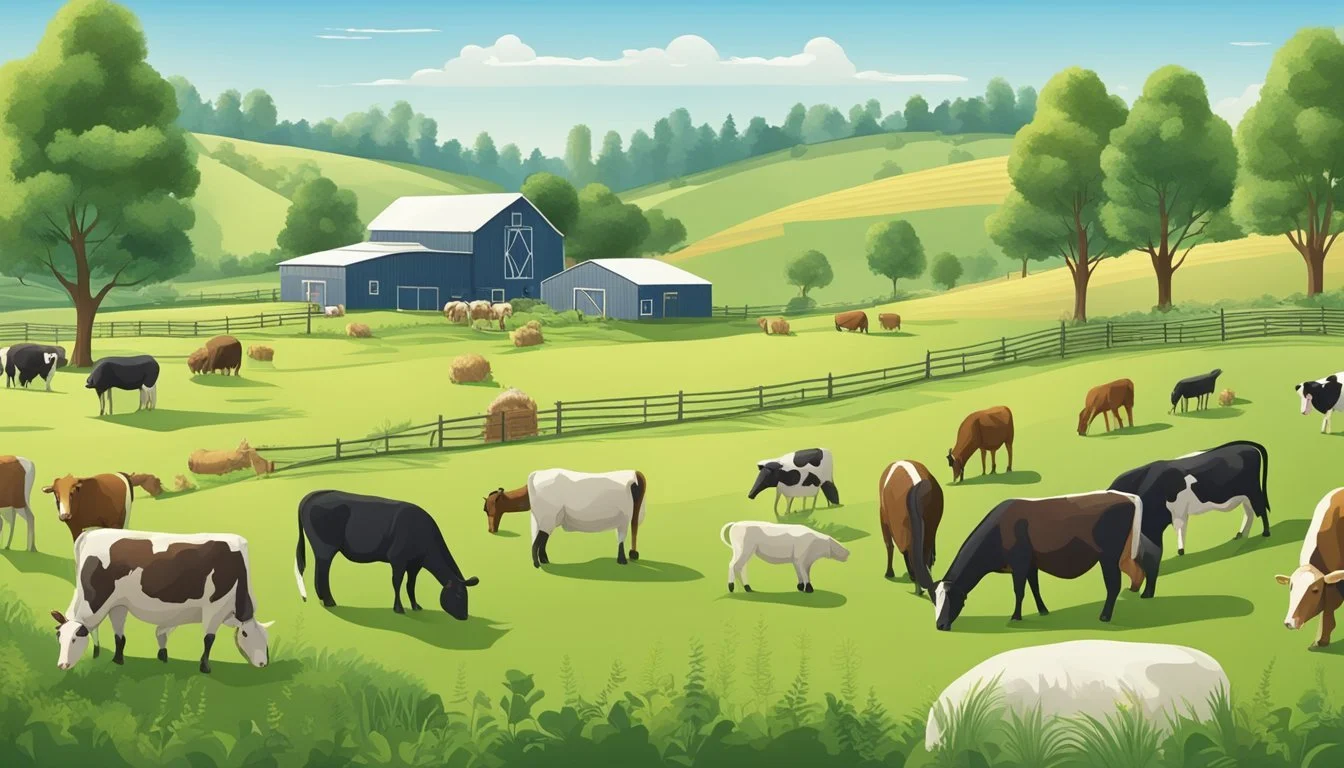The Carnivore Diet for Vegans
Navigating the Ethics and Health Debate
Engaging with the carnivore diet often presents a diametric shift for individuals who have practiced veganism, yet it sparks a unique dialogue about nutrition and ethics. The carnivore diet exclusively promotes the consumption of animal products while eliminating all plant-based foods, which raises important considerations for those concerned with the ethical facets of diet. This diet's supporters claim potential health benefits and simplicity, counterbalancing the increasing lean towards plant-based lifestyles.
From an ethical standpoint, the debate intensifies as many vegans choose their diet based on moral objections to animal cruelty and environmental concerns. However, some proponents of the carnivore diet suggest that, under certain conditions, this way of eating may involve less harm to animals compared to other dietary practices. Nutritional science continues to explore the implications of both diets, analyzing the evolutionary aspects of human consumption patterns and the necessities each diet fulfills or fails to address.
The health implications of such drastic dietary changes are of paramount interest to both the vegan and carnivore communities. Vegans typically enjoy a diet rich in fruits, vegetables, and dietary fiber, with proven benefits for heart health and lower risks of certain chronic diseases. Conversely, the carnivore diet's focus on meat and animal products introduces a different set of nutritional benefits and risks. As the nutritional landscape evolves, it becomes crucial to consider how each diet aligns with health goals and ethical values.
Understanding the Carnivore Diet
The carnivore diet is characterized by an all-meat approach targeting nutrition through animal-based foods, which contrasts significantly with plant-based diets.
Core Principles of the Carnivore Diet
The fundamental concept of the carnivore diet is the consumption of exclusively animal products. Adherents typically eat meat, including beef, pork, chicken, duck, (What wine goes well with duck?) and game, as well as fish and seafood. They often incorporate organ meats like liver, prized for their nutrient density. Byproducts such as eggs, dairy, and cheese also feature in this diet.
Primary Foods:
Red meats (e.g. beef, pork)
Poultry (e.g. chicken, duck)
Seafood (e.g. fish, shellfish)
Organ meats (e.g. liver)
Animal byproducts (e.g. eggs, cheese)
People following this dietary pattern eliminate all plant-based foods, thereby excluding fruits, vegetables, nuts, seeds, grains, and legumes.
Comparing Carnivore and Plant-Based Diets
While plant-based diets draw from a diverse range of non-animal foods, those on a carnivore diet avoid these completely. Comparatively, plant-based diets are typically rich in dietary fiber and certain vitamins and minerals, whereas carnivore diets focus on protein and fat from animal sources.
Comparison of Nutrient Sources: Plant-Based vs. Carnivore Diet
Protein
Plant-Based Sources: Legumes, nuts
Carnivore Diet Sources: Meat, fish, eggs
Fiber
Plant-Based Sources: Fruits, vegetables
Carnivore Diet Sources: None
Vitamin C
Plant-Based Sources: Citrus fruits
Carnivore Diet Sources: Liver, some seafood
Iron
Plant-Based Sources: Spinach, lentils
Carnivore Diet Sources: Red meat, organ meats
Nutritional Profile of an All-Meat Diet
An all-meat diet provides a macronutrient profile high in protein and fat with virtually no carbohydrates. Nutrients like B vitamins, especially B12, zinc, iron, and selenium are abundant in meats, especially organ meats such as liver. The absence of fiber in this dietary approach is noteworthy.
Nutrient Rich:
High in protein: Essential for muscle maintenance and growth.
High in fat: Provides energy and aids in the absorption of fat-soluble vitamins.
Potential Deficiencies:
Lack of fiber: May affect digestive health.
Limited vitamin diversity: Requires careful selection of meats to ensure nutrient requirements are met, such as choosing fatty fish to obtain omega-3 fatty acids.
Individuals who choose the carnivore lifestyle often report goals like fat reduction, improved body composition, and simpler dietary choices. However, health professionals encourage a balanced intake of nutrients, which can require strategic food choices within the carnivore diet to meet all nutritional needs.
Ethical Dimensions of Diet Choices
Dietary choices are often deeply intertwined with ethical considerations. They raise questions about the morality of meat consumption, the treatment of animals in food production, and sustainability issues relevant to the environment.
The Ethics of Meat Consumption
Meat consumption has been scrutinized under the ethical microscope, particularly with regard to the carnivore diet which excludes all plant-based foods. Critics argue that it overlooks ethical concerns by focusing solely on animal products. They highlight issues such as the humane treatment of livestock and the moral implications of killing animals for food. Proponents, on the other hand, contend that some meat-eating practices can be aligned with ethical parameters if managed sustainably and considerately.
Veganism and Animal Welfare
Veganism is often driven by concerns for animal welfare. Vegans maintain that abstaining from animal products is a more ethical choice, as it rejects the commodification of animals and prevents untold suffering in factory farming. By eliminating meat and animal derivatives from their diet, they believe they are taking a stand against animal cruelty and advocating for the rights and well-being of non-human life.
Environmental Considerations
The conversation surrounding diet ethics extends to the environment. Meat consumption is associated with higher environmental impact compared to plant-based diets, including contributions to climate change, deforestation, and the depletion of water resources. The production of animal-based foods often requires more land and water and generates more greenhouse gases. In contrast, plant-based diets are typically presented as more sustainable alternatives that help mitigate negative environmental outcomes. However, nuances exist, such as the debate over whether grazing could be leveraged for ecological benefits.
Nutritional Concerns and Benefits
Navigating the complexities of dietary choices requires a clear understanding of the nutritional impacts they may have. This section will outline the health benefits and potential risks associated with the carnivore diet from a nutritional perspective, addressing the needs of vegetarians interested in the rationale and implications of such an eating pattern.
Health Benefits of a Carnivore Diet
The carnivore diet is abundant in proteins, offering a high intake of essential amino acids necessary for muscle development and repair. It is also rich in iron, vitamin B12, and zinc, which are crucial for maintaining good health and can be more bioavailable from animal sources. Fats found in animal products, particularly Omega-3s, are vital for brain and heart health. Additionally, meat contains nutrients like creatine and carnosine that support muscle function and performance, and vitamin K2, which plays a role in bone health.
Potential Risks and Nutrient Deficiencies
Despite these benefits, the carnivore diet poses several risks due to its exclusion of plant-based foods.
Nutrient Deficiencies: Risks and Plant-Based Sources
Dietary Fiber
Potential Deficiency Risks: Poor digestive health, increased blood cholesterol
Common Non-Meat Sources: Fruits, vegetables, legumes
Certain Vitamins
Potential Deficiency Risks: Vitamins C and E deficiencies
Common Non-Meat Sources: Fruits, vegetables
Calcium
Potential Deficiency Risks: Bone health concerns
Common Non-Meat Sources: Leafy greens, tofu, fortified plant milks
Antioxidants
Potential Deficiency Risks: Increased risk of certain chronic diseases
Common Non-Meat Sources: Berries, nuts, whole grains
Eating a high amount of red and processed meats is linked with increased risks of heart disease, high blood pressure, and certain types of cancer. Furthermore, omitting a diverse range of foods can lead to a narrower intake of some essential nutrients, which could impact overall mental health and well-being.
Balancing Carnivore and Vegan Elements
For individuals looking to incorporate elements of a carnivore diet into a vegan lifestyle, it is important to strike a balance while ensuring nutritional adequacy. A combination approach can be adopted where one prioritizes nutrient-dense plant and animal sources.
Nutritional Recommendations for a Balanced Diet
Protein Sources
Recommendation: Combine animal proteins with legumes and seeds for a full amino acid profile.
Fat Intake
Recommendation: Include both plant-based and animal-based fats for a diverse intake of fatty acids.
Iron and Vitamin B12
Recommendation: Ensure adequate levels from both supplements and animal sources if necessary.
Bone Health Nutrients
Recommendation: Maintain adequate intake of vitamin K2 and calcium through diet or supplementation.
This hybrid dietary approach aims to minimize nutrient deficiencies and health risks while reaping the nutritional benefits of animal products.
Adaptations for Vegans Interested in Carnivore Elements
Vegans interested in incorporating elements from the carnivore diet must navigate considerable ethical and nutritional landscapes. This involves both the careful selection of animal-sourced nutrients critical for health, and devising strategies for ethical meat consumption when assimilating aspects of the carnivore philosophy.
Incorporating Critical Nutrients from Animal Sources
Animal products are unique in providing certain nutritional elements that are less prevalent or bioavailable in plant-based foods. Here are two key nutrients along with their plant-based and supplemented alternatives:
Vitamin B12: This essential nutrient, predominantly found in animal products, is critical for nerve function and the production of DNA and red blood cells. Vegans might consume fortified foods or supplements to meet their B12 requirements.
Complete Proteins: Animal products contain all nine essential amino acids, making them "complete" proteins. Vegans may rely on a variety of plant-based protein sources such as quinoa, soy, and rice and beans eaten together to ensure they're getting the full spectrum of necessary amino acids.
Strategies for Ethical Meat Consumption
For those who identify with the principles of veganism but are looking to incorporate elements of the carnivore diet, ethical consumption is paramount.
Sourcing: It's advisable to select meat from local, sustainable farms where animals are treated humanely.
Frequency: Limiting meat intake to occasional consumption can be a strategy to balance both health goals and ethical concerns.
Byproducts: Introducing eggs and dairy from ethical sources into a vegan diet can provide a middle ground for those seeking to retain mostly plant-based habits while adding certain carnivore elements. Selecting pasture-raised eggs and dairy products can be a conscientious choice.
These adaptations aim to bridge the gap between vegan values and the nutritional benefits attributed to a carnivore diet, respecting both ethical considerations and health objectives.
Carnivore Diet and Physical Well-being
The Carnivore Diet has been associated with various physical well-being outcomes, such as altered body composition and weight loss, impacts on mental function, and potential changes in digestion and inflammatory responses.
Impact on Weight Loss and Body Composition
The Carnivore Diet typically leads to a reduction in carbohydrate intake, which can result in weight loss due to decreased glycogen stores and water retention. Individuals may experience significant fat loss while preserving lean muscle mass, attributed to high protein consumption. Strength gains and maintenance are often reported due to the diet's protein density, which is crucial for muscle repair and growth.
Influence on Mental Clarity and Health
Anecdotal evidence suggests that some individuals on the Carnivore Diet report improved mental clarity and concentration. This could be due to stabilized blood sugar levels and the absence of dietary components that may cause mood fluctuations. However, long-term studies on brain health and function are limited and more research is needed to substantiate these claims.
Digestion and Inflammation
Some advocates of the diet report improved digestion due to the elimination of plant-based fibers and compounds that can be irritants to the gut. The reduction in inflammation has also been noted, which may be related to the exclusion of foods that can potentially cause inflammatory responses. However, such effects are highly individualized and may vary widely from person to person.
Challenges and Considerations in Transitioning
The shift from a vegan to a carnivore diet requires careful consideration of nutritional balance and ethical implications. Individuals must navigate a spectrum of health, animal welfare concerns, and dietary adjustments.
From Vegan to Carnivore: A Gradual Shift
Transitioning diets directly affects nutrient intake, specifically protein and dietary fiber. A vegan diet typically high in fiber but may lack certain elements that are more abundant in animal products, such as vitamin B12 and heme iron, which play significant roles in managing conditions like anemia and supporting overall health. Individuals should ensure their new diet provides all essential nutrients. Animal welfare concerns also arise. Ethical vegans must reconcile their beliefs with the consumption of animal products, which they may have previously avoided.
Maintaining a Balanced Approach
Processed foods often become a concern when transitioning to a carnivorous diet. Vegans used to whole foods must be cautious to not substitute with processed meats, which are linked to increased risks for conditions such as high blood pressure and colon cancer. Focusing on unprocessed, whole food sources of animal products can aid in the prevention of such health issues. A balanced approach means consuming a variety of foods to maintain nutrient diversity, taking care not to introduce disproportionately high amounts of any one type of food.
Culinary Perspectives
Navigating the culinary landscape requires a keen understanding of how diet choices impact meal preparation and ingredient substitution, particularly when adapting meals for varied dietary preferences.
Preparing Animal-Based Meals for Vegans
When preparing animal-based meals for vegans, chefs must replace meats and dairy products with plant-based alternatives that mimic the texture and flavor profiles of traditional dishes. Proteins like tofu, tempeh, and seitan (What wine goes well with seitan?) stand in for meats due to their ability to absorb flavors and provide a satisfying chew. Legumes such as lentils and chickpeas can also be used to create hearty, protein-rich meals. To replace dairy, options such as almond milk, soy milk, and vegan cheeses are utilized, often offering a similar creaminess to dishes. Replacing butter and lard, chefs can use oils such as olive or avocado for cooking and baking, which provide the necessary fats without animal products.
Creative Adaptations for Traditional Vegan Recipes
Traditional vegan recipes can be creatively adapted to enhance their nutrient profile and flavor, incorporating a variety of seeds, nuts, and grains. To boost fiber and essential fatty acids, flaxseeds, chia seeds, and hemp seeds can be sprinkled into dishes. For a nutty crunch, almonds, walnuts, or cashews serve as excellent toppings or ingredients. Grains like quinoa, barley, and brown rice add texture and are foundation ingredients in vegan cuisine. These adaptations not only increase the nutritional value but also expand the flavor palette, allowing for a diverse range of satisfying vegan dishes.
Ethical and Sustainable Meat Sources
When considering the carnivore diet from a vegan perspective, sourcing meat ethically and sustainably is crucial. This involves exploring meat production methods that minimize environmental impact and provide animals with humane living conditions.
Exploring Pasture-Raised and Regenerative Farming
Pasture-raised farming is a system where animals such as cows (beef) and sheep (lamb) graze on grass for the majority of their lives. Unlike conventional methods, this approach can benefit the environment by enhancing soil quality and promoting biodiversity.
Animals are given more space to roam, potentially leading to healthier lives and, by extension, more ethically raised livestock.
Regenerative farming goes further, aiming to restore degraded land via rotational grazing and organic practices. This method has the potential to sequester carbon from the atmosphere, contributing to a reduction in greenhouse gases.
Impact of Meat Production on the Environment
The production of meat significantly affects the environment through resource use and pollution.
Beef production is particularly resource-intensive, often requiring more land, water, and feed compared to other livestock.
Lamb, while slightly less impactful than beef, still contributes notably to land and water use.
Here's a quick comparison of environmental impacts associated with different farming practices:
Conventional Beef Farming
Land Use: High
Water Use: High
Biodiversity Impact: Negative
Pasture-Raised Beef
Land Use: Moderate
Water Use: Moderate
Biodiversity Impact: Potentially Positive
Regenerative Farming (Beef)
Land Use: Low
Water Use: Low
Biodiversity Impact: Positive
Conventional Lamb Farming
Land Use: High
Water Use: High
Biodiversity Impact: Negative
Pasture-Raised Lamb
Land Use: Moderate
Water Use: Moderate
Biodiversity Impact: Potentially Positive
Sustainable meat sources are therefore not just about the well-being of animals but also about preserving ecosystems and mitigating climate change.
Conclusion
The debate over the carnivore and vegan diets encompasses multiple facets, including health, ethics, and environmental impact. Individuals following a carnivore diet may argue that it offers potential benefits, such as certain improvements in health markers and simplification of dietary choices. In contrast, the vegan diet is often highlighted for its positive impact on environmental sustainability and its basis in ethical considerations regarding animal welfare.
From a health perspective, scientific evidence supports the idea that plant-based diets can lower the risk of chronic diseases. However, some individuals report improved health outcomes on a carnivore diet. It is crucial to consult with healthcare professionals and consider individual nutritional needs when choosing a diet.
Ethical considerations differ significantly between the two diets. Vegans typically abstain from animal products due to a moral stance on animal rights. On the other hand, proponents of a carnivore diet may prioritize personal health outcomes over ethical implications related to animal consumption.
Environmental concerns are also at the forefront of this discussion. A growing body of research suggests that reducing meat consumption can lead to lower greenhouse gas emissions and a lesser environmental footprint. The vegan diet aligns with these findings, advocating for plant-based eating as a more sustainable option.
In making dietary choices, individuals must weigh the health, ethical, and environmental consequences of their food consumption. A well-informed decision takes into account personal values, empirical evidence, and potential impacts on oneself and the world.








